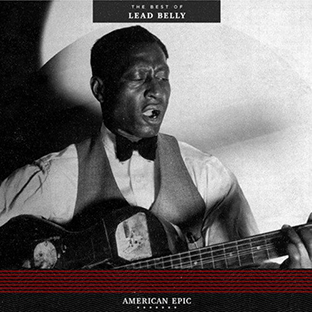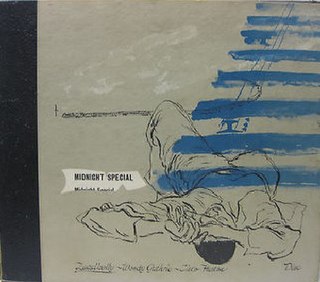
Huddie William Ledbetter, better known by the stage name Lead Belly, was an American folk and blues singer notable for his strong vocals, virtuosity on the twelve-string guitar, and the folk standards he introduced, including his renditions of "In the Pines", "Goodnight, Irene", "Midnight Special", "Cotton Fields", and "Boll Weevil".

Anthology of American Folk Music is a three-album compilation, released in 1952 by Folkways Records, of eighty-four recordings of American folk, blues and country music made and issued from 1926 to 1933 by a variety of performers. The album was compiled from experimental film maker Harry Smith's own personal collection of 78 rpm records.
"The Bourgeois Blues" is a blues song by American folk and blues musician Lead Belly. It was written in June 1937 in response to the discrimination and segregation that he faced during a visit to Washington, D.C. to record for Alan Lomax. It rails against racism, the Jim Crow laws, and the conditions of contemporary African Americans in the southern United States. The song was recorded in December 1938 for the Library of Congress and re-recorded in 1939 for commercial release.
Smithsonian Folkways is the nonprofit record label of the Smithsonian Institution. It is a part of the Smithsonian's Smithsonian Center for Folklife and Cultural Heritage, located at Capital Gallery in downtown Washington, D.C. The label was founded in 1987 after the family of Moses Asch, founder of Folkways Records, donated the entire Folkways Records label to the Smithsonian. The donation was made on the condition that the Institution continue Asch's policy that each of the more than 2,000 albums of Folkways Records remain in print forever, regardless of sales. Since then, the label has expanded on Asch's vision of documenting the sounds of the world, adding six other record labels to the collection, as well as releasing over 300 new recordings. Some well-known artists have contributed to the Smithsonian Folkways collection, including Pete Seeger, Ella Jenkins, Woody Guthrie, and Lead Belly. Famous songs include "This Land Is Your Land", "Goodnight, Irene", and "Midnight Special". Due to the unique nature of its recordings, which include an extensive collection of traditional American music, children's music, and international music, Smithsonian Folkways has become an important collection to the musical community, especially to ethnomusicologists, who utilize the recordings of "people's music" from all over the world.

American singer-songwriter Woody Guthrie's published recordings are culled from a series of recording sessions in the 1940s and 1950s. At the time they were recorded they were not set down for a particular album, so are found over several albums not necessarily in chronological order. The more detailed section on recording sessions lists the song by recording date.
Folkways Records was a record label founded by Moses Asch that documented folk, world, and children's music. It was acquired by the Smithsonian Institution in 1987 and is now part of Smithsonian Folkways.
Moses Asch was an American recording engineer and record executive. He founded Asch Records, which then changed its name to Folkways Records when the label transitioned from 78 RPM recordings to LP records. Asch ran the Folkways label from 1948 until his death in 1986. Folkways was very influential in bringing folk music into the American cultural mainstream. Some of America's greatest folk songs were originally recorded for Asch, including "This Land Is Your Land" by Woody Guthrie and "Goodnight Irene" by Lead Belly. Asch sold many commercial recordings to Verve Records; after his death, Asch's archive of ethnic recordings was acquired by the Smithsonian Institution, and released as Smithsonian Folkways Records.
Folkways: The Original Vision was released in 1989 and is the first album created by Folkways Records under new acquisition by the Smithsonian Center for Folklife and Cultural Heritage following the death of the record label's founder, Moses Asch. Funds were raised for the acquisition of the label to be established as a non-profit entity in conjunction with the Smithsonian Institution by the collaborative recording A Vision Shared: A Tribute to Woody Guthrie and Lead Belly by artists such as Bruce Springsteen, Bob Dylan, and U2. Folkways: The Original Vision was digitally remastered and re-released in 2005 by Folkways Records.
My Dusty Road is a 4 CD box set of Woody Guthrie music containing 54 tracks and a book. It is a collection of the newly discovered Stinson master discs. It was released by Rounder Records in 2009.
Stinson Records was an American record label formed by Herbert Harris and Irving Prosky in 1939, initially to market, in the US, recordings made in the Soviet Union. Between the 1940s and 1960s, it mainly issued recordings of American folk and blues musicians, including Woody Guthrie and Josh White.

The Midnight Special and Other Southern Prison Songs is an album by Lead Belly and the Golden Gate Quartet, recorded for Victor Records in 1940 and released a few months later.

Trouble in Mind is an album by American blues musician Big Bill Broonzy. It was released on February 22, 2000 by Smithsonian Folkways. The album consists of traditional folk, blues, and spiritual songs featuring Broonzy accompanying himself on acoustic guitar and a guest appearance by Pete Seeger. Suffering from cancer, Broonzy realized his time was limited and hence recorded extensively between 1956 and 1957. While most of the work draws from the album Big Bill Broonzy Sings Country Blues (1957), arranged by Moses Asch and Charles Edward Smith, Trouble in Mind is also sourced from concert broadcasts and interviews recorded late in Broonzy's career.
Jeff Place is the Grammy-award-winning Archivist and Curator at the Smithsonian Center for Folklife and Cultural Heritage. He and Anthony Seeger were the first two full-time employees hired in 1987 when the Smithsonian acquired Folkways Records from the estate of Folkways founder Moses Asch.

American Epic: The Best of Lead Belly is a compilation of Lead Belly's first commercial recordings made in 1935 and released in 2017 to accompany the award-winning American Epic documentary film series. The album was released as a 14-track download and a vinyl LP.

Lead Belly Sings for Children is a compilation album by American folk and blues singer Lead Belly. It was released in 1999 by Smithsonian Folkways.

Negro Sinful Songs is a 1939 album by Lead Belly, produced by Alan Lomax. On April 1, 1939, Lead Belly had a recording session with Musicraft Records. There were a total of 14 takes, with 10 of them being selected for the album. Negro Sinful Songs was originally released as a five-disc collection of 10" 78 rpm records, catalog number Musicraft Album 31.

Work Songs of the U.S.A. is an album by Lead Belly, recorded in 1942 and released a few months later by Asch Recordings.

Songs by Lead Belly is an album by Lead Belly, recorded in 1943 by Asch Recordings and probably released in 1944.

Negro Folk Songs is an album by Lead Belly, recorded in 1943 and released as an album in early 1946.

Midnight Special is an album by Lead Belly, Woody Guthrie, and Cisco Houston, recorded in 1946 and released as an album in 1947.












